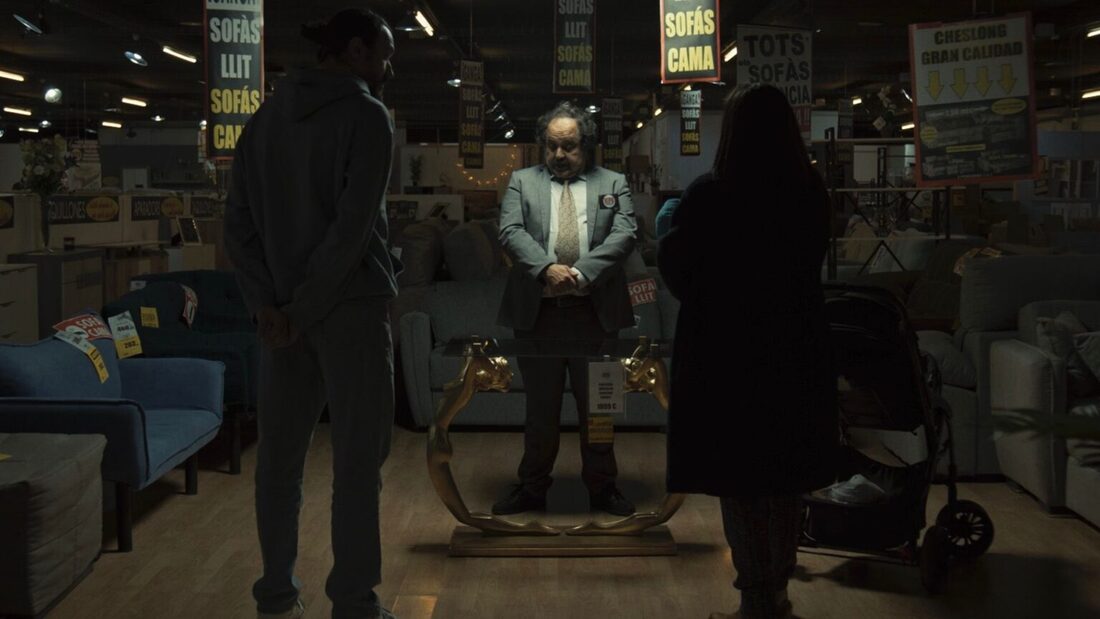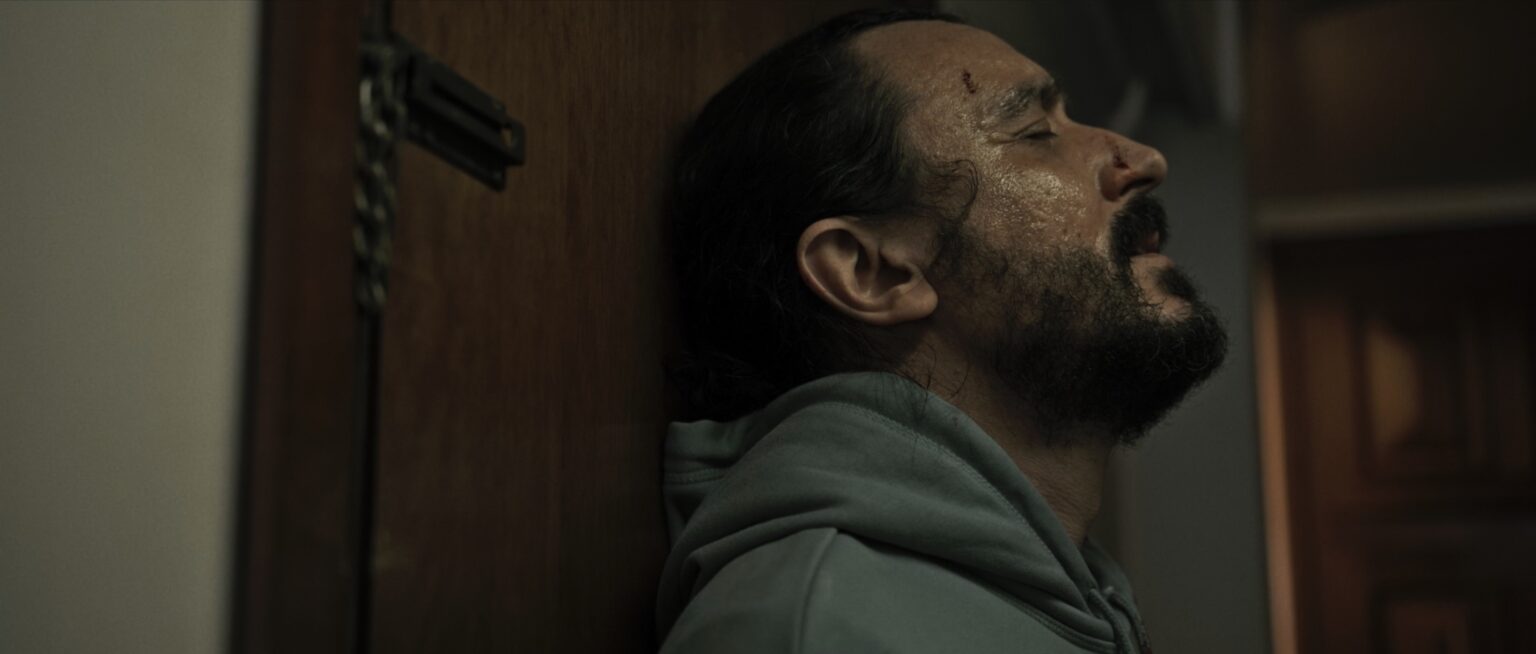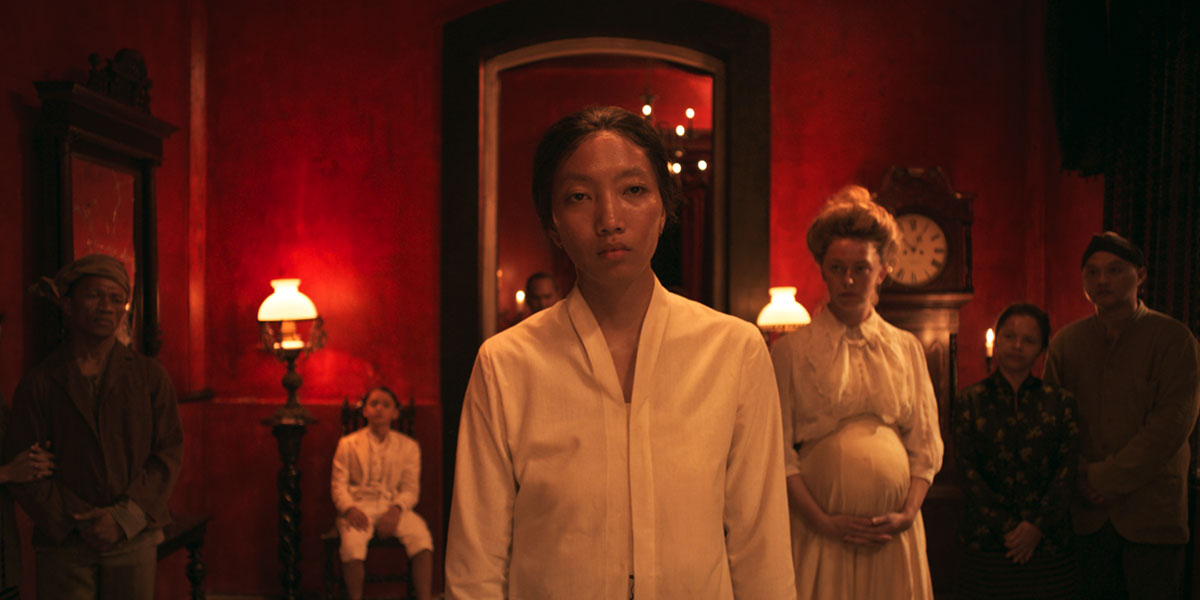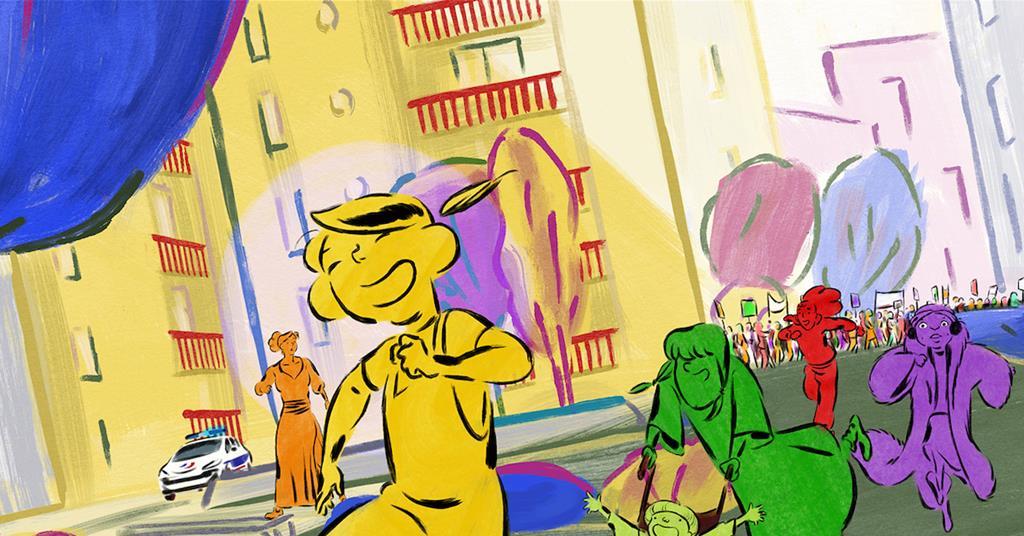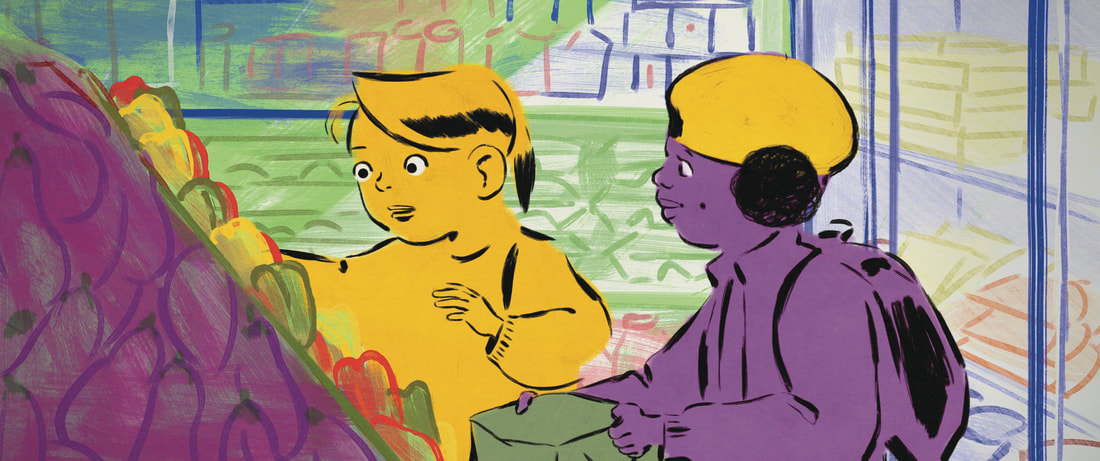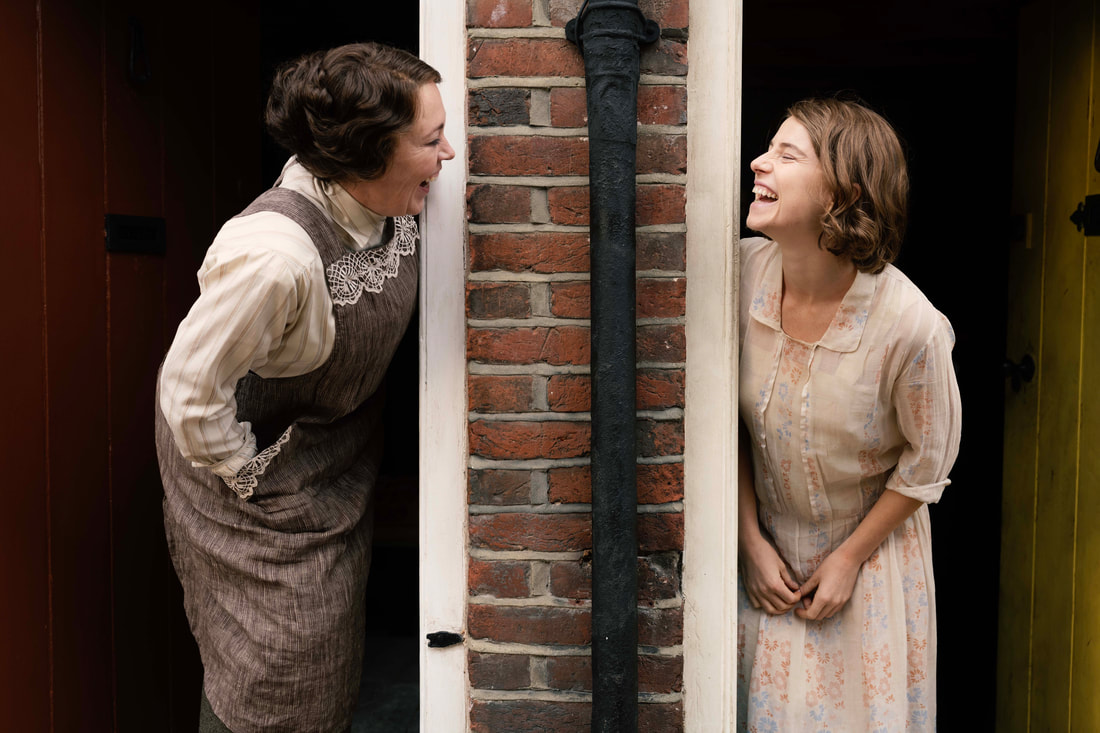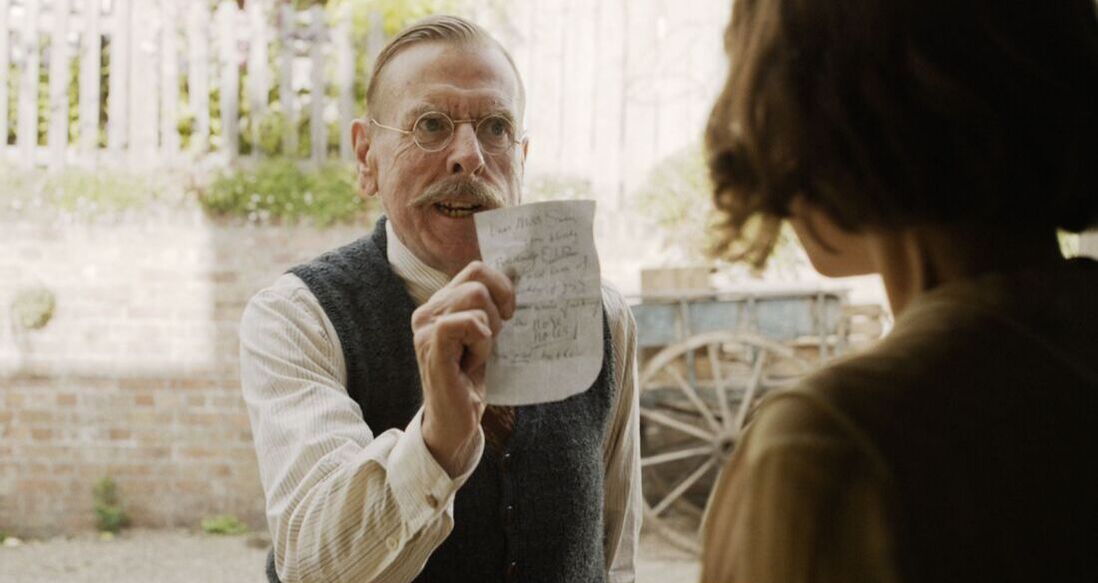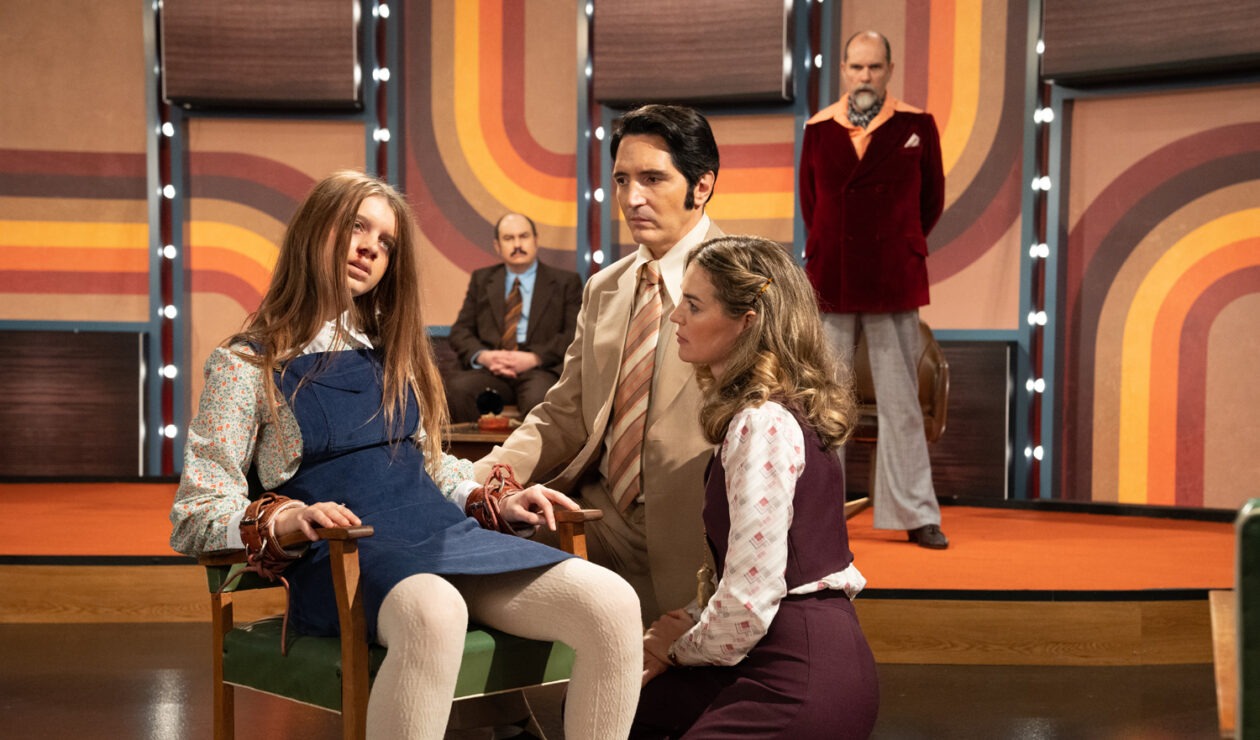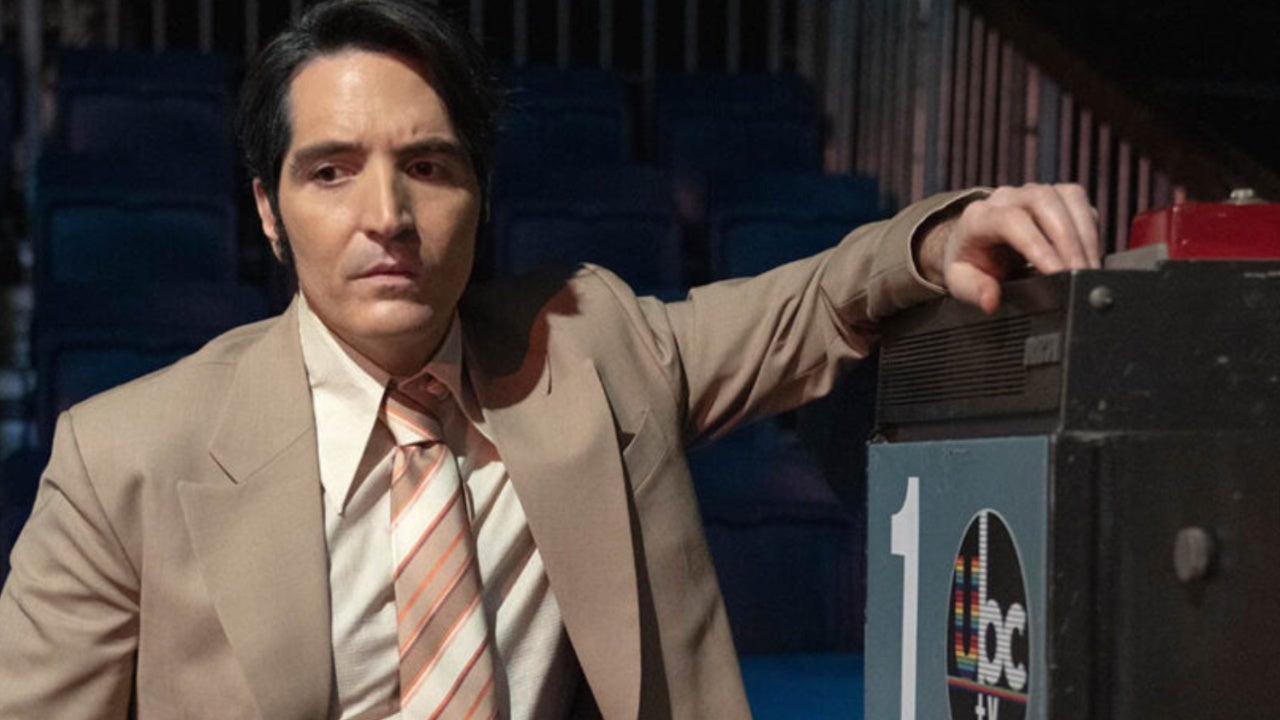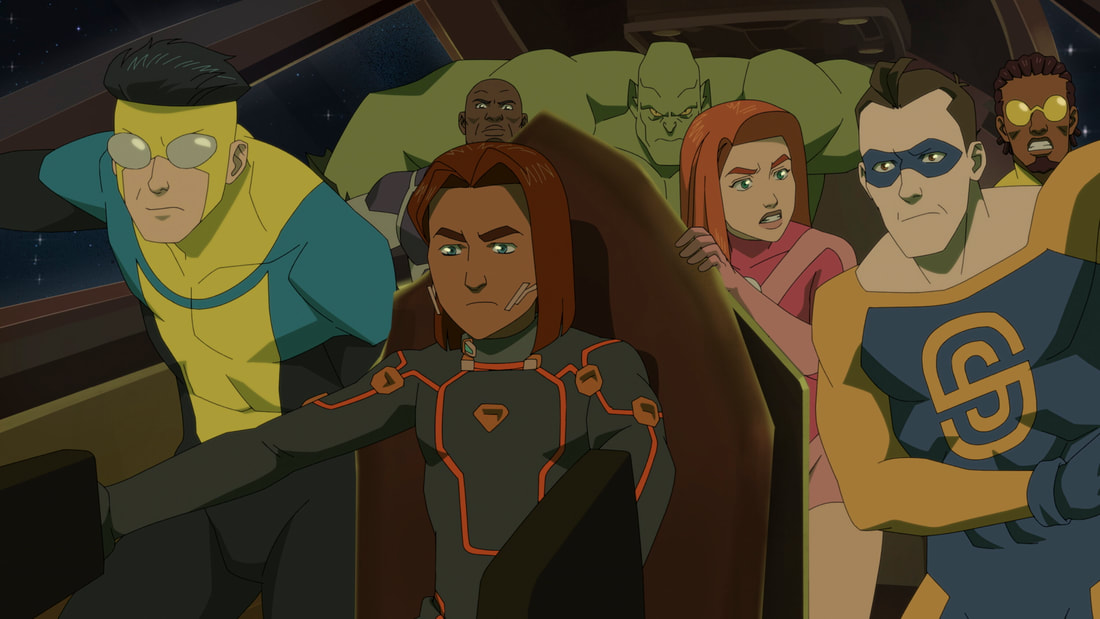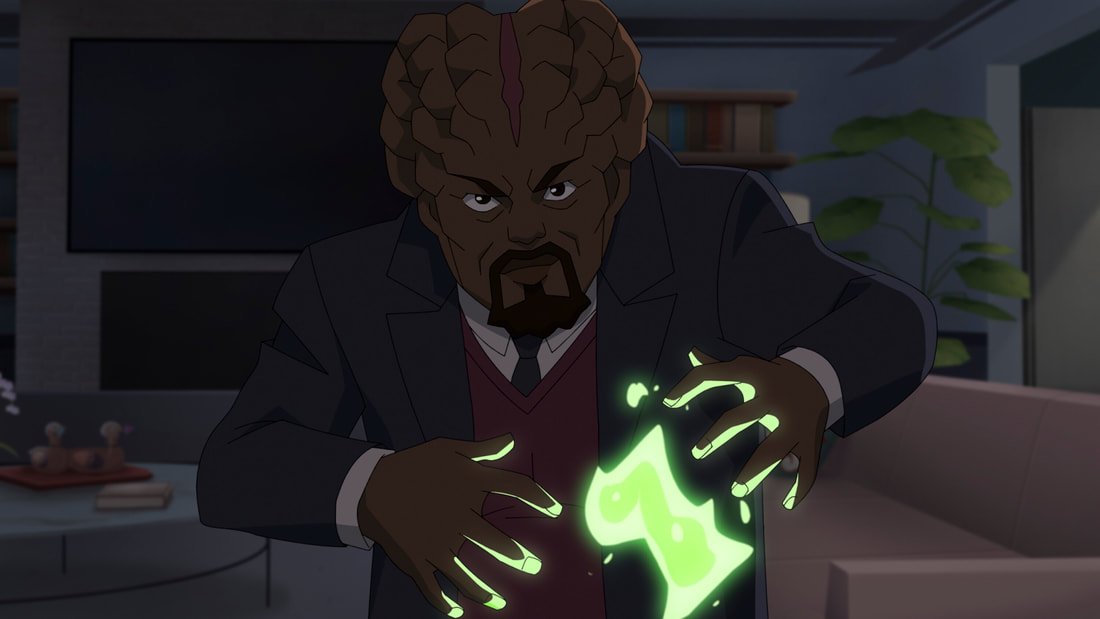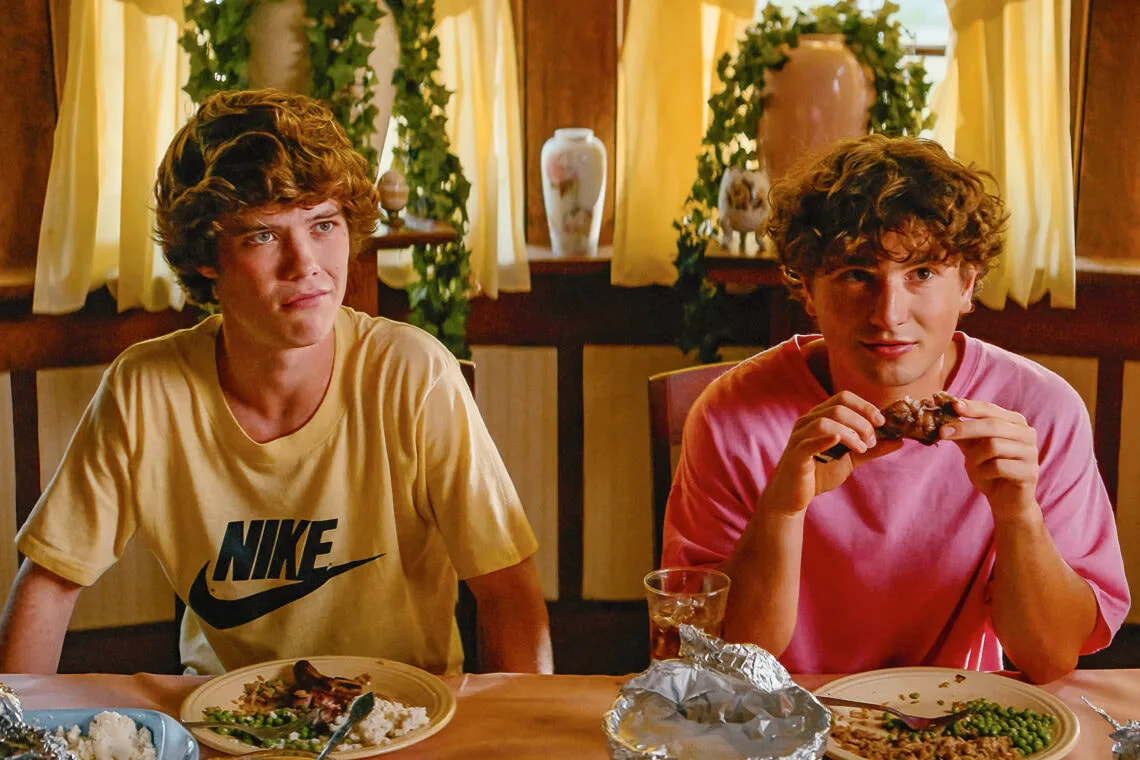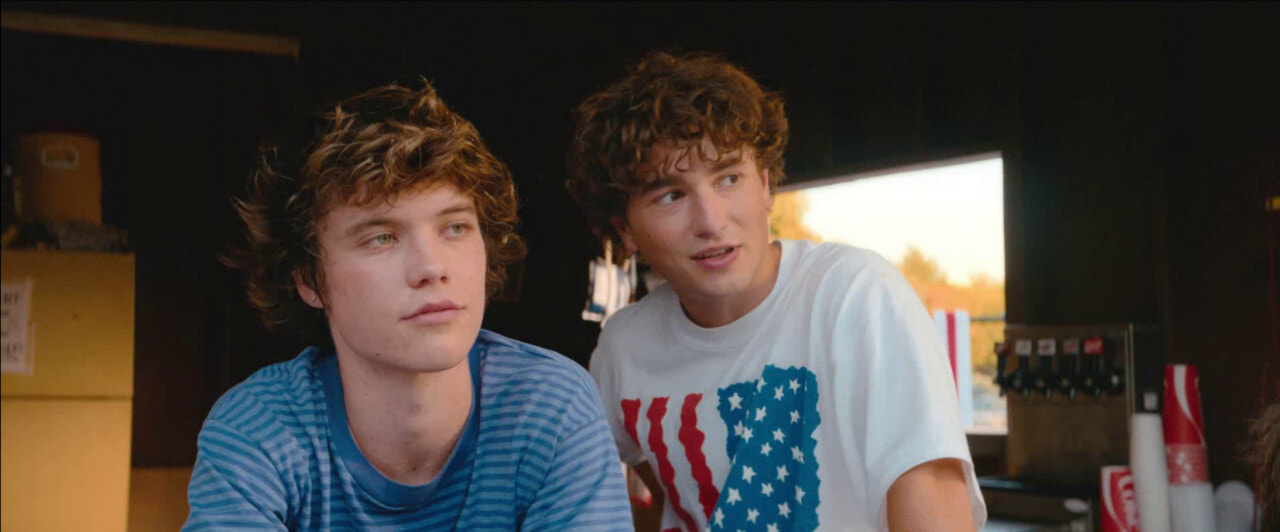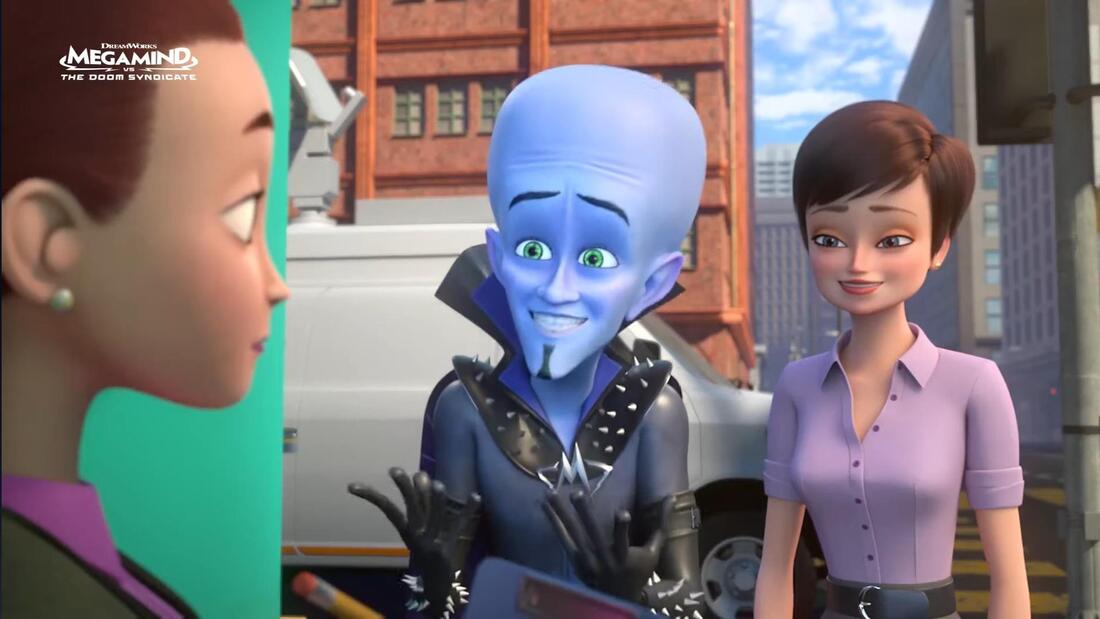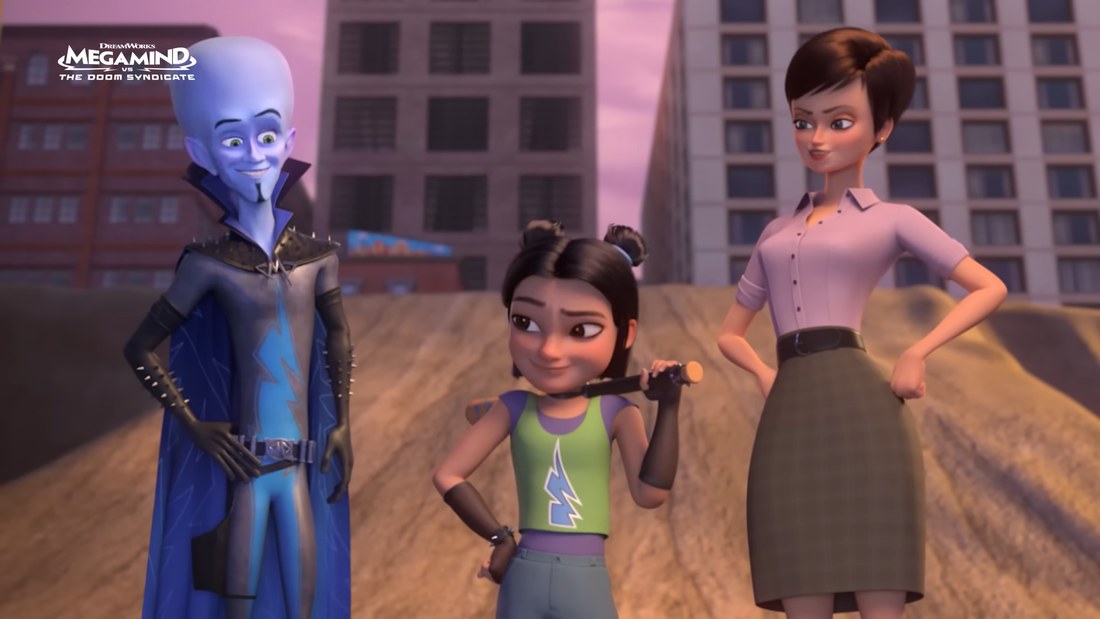|
Review by Camden Ferrell Making a purchase you later regret is a universal experience. However, one can only hope that the events of The Coffee Table, which transpire after such a purchase, are as far from universal as possible. This is the second feature length film from director Caye Casas and has been played at multiple festivals since its premiere in November 2022. This horror movie is an anxiety-inducing experience that keeps you engaged from start to finish. Jesus and Maria are new parents who are dealing with the struggles of marriage and parenthood. One day, in an attempt to make their place look nicer, the couple goes furniture shopping. On this trip, Jesus finds a tacky coffee table that he buys despite Maria’s hatred of it. Soon, this purchase becomes the biggest mistake of this couple’s lives, and it changes their world forever. It’s a purposefully vague premise just because saying anything more might ruin one’s experience watching this movie. Suffice it to say, there’s an entire can of worms awaiting viewers who choose to embark on this experience. Written by Casas and Cristina Borobia, this movie is mostly dialogue driven after its opening act, and it works on multiple levels. It’s strong conversational dialogue, but it also doesn’t undermine or overpower the underlying feeling of dread and anxiety that plague the movie. The writers reveal their hand incredibly early in the movie but manage to still maintain engagement and intrigue until its final moments. The performances are another strong aspect of this movie. Led by David Pareja and Estefanía de los Santos as Jesus and Maria, they both bring a lot to the table. They have strong chemistry as disenchanted lovers combined with the stress of being new parents. Pareja especially gets a lot to work with throughout the movie, and he is the driving force of the anxiety that defines the film. They work well with the conversational dialogue and the conflicts big and small that they find themselves faced with.
This is such a difficult movie to talk about just because of how important it is for the viewer to go into it blind. While the movie still works even with crucial details revealed, I think shock factor plays an important part in the perception of the film. Regardless, it’s hard to find a horror movie more disturbing than this, and it does so while keeping making most graphic imagery implied or minimal. It’s no small feat, and it’s one that requires prowess from all departments. The only main flaw is that sometimes it feels like it’s aiming for pitch black comedy, and this doesn’t always land because of how straight the execution is. It’s a subtly confusing juggling of genres that is noticeable but doesn’t take away from how impressive the movie is as a whole. The Coffee Table is a unique movie that is distressing, disturbing, and dreadful in all the right ways. It’s tragic and tense, and its brief runtime never gives the audience a chance to breathe. It’s an impressive calling card for Casas as a director, and this movie will likely find a strong niche in the horror community. There are some small tonal problems, but it’s not enough to detract from how darkly entertaining the final product is. The Coffee Table is in theaters April 19. Rating: 4/5
0 Comments
Review by Camden Ferrell Not to be confused with the Johnny Knoxville movie coming out later this year, Sweet Dreams is a Dutch production that played at the 2023 Toronto International Film Festival. This serves as the sophomore feature for writer and director Ena Sendijarevic. The movie boasts some breathtaking and creative cinematography and while it has some entertaining moments and interactions, it doesn’t make the most effective use of its satirical nature. Jan is the Dutch owner of a sugar plantation in Indonesia. One day, he suddenly dies, and his son and his pregnant wife come to the island to inherit the empire. However, things are complicated by numerous events including the fact that Jan bequeathed his plantation to his illegitimate son he fathered with his housemaid Siti. This is a cleverly unique premise that perfectly sets up the power dynamics of colonialism that the film aims to explore. From a writing standpoint, Sendijarevic has a clear thesis from the start, and the interactions of the many characters support this. Its themes are clear, but sometimes it feels like the plot doesn’t progress at a pace that is the most conducive to furthering her ideas. However, on a purely surface level, this script has some great moments of comedy and borderline quirky absurdism that might remind people of other specific films (which I won’t name here), but she still manages to make it feel distinctly her own. The performances in this movie are mostly strong. Renée Soutendijk plays Agethe, Jan’s widow and as a seasoned actress, she definitely brings the character to life even when the material isn’t always the best for her particular character. Hayati Azis is also quite strong and subdued in her role as Siti, a complex character that she plays very well while understanding the ethos of the film. However, Florian Myjer, who plays Jan’s son Cornelis, is quite hilarious in most of his scenes. It teeters on being overly animated, but he’s able to reel it in just enough for the kind of movie this is.
While the movie succeeds on multiple fronts, it also feels like it doesn’t fully live up to its potential. The themes are so rich and ripe for satire, and while it certainly has a lot to say, I can’t say it gets the most mileage out of its runtime. There are moments that seem to meander too much which kill its momentum and cause the satire to suffer as a result. These issues aren’t too prevalent thankfully, and the movie still has a lot of surface beauty that gives it plenty of merit. Its cinematography is impressive and vibrant, and it elevates the impact of the movie as a whole. Sweet Dreams is a smart satire with strong performances and great imagery. It tackles themes of colonialism and the resulting issues of it, and even though it could have been richer, it is still a strong film that is confident in its message. Sweet Dreams is in theaters April 12. Rating: 3.5/5 Review by Camden Ferrell If one were to look at the most recent slate of Academy Award nominees for Animated Feature, one would find films about multiversal threats, existential fantasy with complex elements, and a shapeshifter on a city-saving quest among others. In the midst of the limitless imagination and high stakes of animation, it’s also nice to find some more subtle and low-stakes journeys such as Robot Dreams, another Oscar-nominee from this past year. Chicken for Linda! is another example of simple animated storytelling that strips down its storytelling to its bare bones and finds beauty regardless. This French film from directors Chiara Malta and Sébastien Laudenbach uses beautiful hand-painted imagery to give audiences a short, simple, and sweet film that is low-stakes, relaxing, and enjoyable. Linda is a young French girl who gets accused of giving away her mother’s prized ring. After unfairly punishing her, Linda’s mother Paulette discovers that Linda was not guilty of the act for which she had been disciplined. Feeling guilty for her unjust actions, Paulette agrees to fulfill a request from her daughter, a meal of chicken and peppers. Paulette, despite not knowing how to cook, sets forth to make this meal for her daughter in spite of ongoing labor strikes and other obstacles. This is a very simple premise that almost feels too bare at first, but the filmmaking team does a great job of making the most of its setup. Written by Malta and Laudenbach, the movie’s dialogue is straightforward and undemanding yet does a fantastic job of characterizing its players. The movie is able to effectively convey the characteristics of both Linda and Paullette while communicating their relationships and unique mother-daughter dynamic. From a story standpoint, it does a lot with little. With such a simple jumping off point, the movie is able to creatively tell its story in a way that is unique but doesn’t sacrifice its charming simplicity. One of the most distinctive aspects of this movie is its animation. It has a gorgeous and unique style that pops out to the viewer. It uses color-blocked characters in an engaging and visually impressive way that helps tell its story more effectively. There are also a handful of sequences in the movie that enter into a realm of fantasy that is fun and vibrant.
While it’s a cute and charming story with great animation, its main flaw can sometimes come from its occasional moments of convolution. As events spiral out of control for Paulette, certain narrative beats can feel like they briefly abandon the film’s simplicity, and the story suffers as a result. However, these flaws are far and few between, and the story recovers nicely. An adorable animated feature that both adults and kids will enjoy, Chicken for Linda! is yet another example of the joy and beauty that can be found in low-stakes storytelling. It makes the most of its simple premise and manages to be visually dazzling as well. It’s not perfect, but at seventy minutes, there’s no reason not to watch it. Chicken for Linda! is in theaters April 5. Rating: 4/5 Review by Camden Ferrell Wicked Little Letters is the newest movie from director Thea Sharrock and marks the feature writing debut of Jonny Sweet. This movie had its premiere at the 2023 Toronto International Film Festival. Even if it doesn’t make the most of its extremely talented cast, this is a movie with enough enjoyable moments to overcome how quickly its novelty wears off. The movie is based on a true story of a scandal that took place in a small town in 1920’s England. Edith is a devout Christian woman who lives with her parents and is horrified to receive numerous profanity-ridden letters that insult and belittle her. When this gets reported, it is first believed to be the work of her Irish immigrant neighbor Rose who is known for her foul mouth and crude behavior. However, as time passes, more information is revealed about the letters that shock the entire community. This is a fun story that combines some crass shock humor and mystery and had the potential to make great use of its leading ladies. The real appeal of this film’s script comes from its vulgar premise. However, these profane jokes and comments lose their charm and novelty quite quickly. Since it’s the premise of the movie, these particular moments persist throughout and suffer from diminishing returns quite notably. However, it does benefit from the subplot involving Gladys, a policewoman who is trying to get to the bottom of the whole ordeal. Additionally, there are some interesting character moments throughout that gives the movie a heart at its core. By far and away, the best part of this movie is its performances. The material provided doesn’t get the most mileage out of their talents, but they are still wonderful to watch. Led by Olivia Colman and Jessie Buckley, they are both great character foils and play off each other well. Their comedic timing is entertaining, and they bring their trademark charm to their roles nicely. The supporting cast, consisting of Anjana Vasan and Timothy Spall among others, isn’t given nearly as much to work with, but they are decent with what they are given.
This movie doesn’t aim to tackle any thought-provoking social issues related to its premise, but it doesn’t need to. The director understands that this movie was never meant to incite conversation or profound discussion, and the movie operates under that umbrella of casual entertainment where it thrives best. It’s the kind of movie you can nonchalantly watch with family on a nice afternoon and get a few good laughs out of. It’s not particularly great as a movie, but it’s exactly what it needs to be. Wicked Little Letters has some wit to go nicely with its large number of expletives. Viewers won’t be blown away by its humor, but everyone can still get a kick out of Buckley and Colman doing their respective thing on screen. Even if it could have been better, it’s still an enjoyable comedy, nonetheless. Wicked Little Letters is in theaters March 29. Rating: 3.5/5 Review by Camden Ferrell Late Night with the Devil is the newest film from the Carines Brothers, a writing/directing duo that made their feature film debut in 2012. Their third feature had its premiere at the 2023 SXSW Film Festival. Led by a captivating performance from David Dastmalchian and utilizing the found footage format to shocking effect, this indie horror is one that is simple yet crazily effective. Jack Delroy is a late-night talk show host who, despite once being touted as Johnny Carson’s successor, is now fearing his show is nearing its end. In order to boost ratings, he hosts a Halloween special on his show where he invites a parapsychologist and her troubled patient among other guests. Then, on live television, unthinkable and horrifying events unfold. This is a unique premise that really grabs your attention and combines the found footage style of storytelling with behind-the-scenes action to tell its story. From a writing standpoint, the script does its job. It doesn’t say anything too poignant for the most part, but it does lay a solid foundation for the actors and horror to build off of. I’d go as far as to say, the writing is just adequate for most of its runtime, but the movie works on so many other levels that the script doesn’t need to be revolutionary in any way. The aspect of this movie that deserves the most praise is its acting. Dastmalchian has cemented himself as one of the best current character actors, and in this movie, he proves his worth as a leading man. Playing the charismatic yet troubled Jack Delroy, he impresses on every level, handling both the light and heavy material wonderfully. The supporting cast is also quite strong including a chilling performance from young actress Ingrid Torelli.
As a horror movie, it’s not going to make you jump out of your seat, and it’s not trying to get a cheap thrill out of the audience either. It feels like every scene of anxiety or terror is truly earned, and the Carines Brothers really nail the pacing required to pull of these scary moments. They know when to go big and bold, and they also know when it’s appropriate to reign it in. This tango they do allows the movie to flow nicely while making viewers eagerly await the next scary moment. At 90 minutes, the movie breezes by in an instant and knows when it’s time to pack it up. Admittedly the final sequence does get quite ambitious and loses some of the film’s found footage charm, but they thankfully recover nicely for its chilling final moment. Late Night with the Devil is an indie horror gem that will hopefully find a large audience upon release. It’s a great showcase for its leading man while also displaying the horror filmmaking prowess of its directors. It’ll always leave you guessing, and it’ll never make you feel bored. While it’s not the best that the genre has to offer, it’s still an entertaining movie worth your time. Late Night with the Devil is in theaters March 22. Rating: 4/5 INVINCIBLE (Season 2, Part 2) -- An Exhilarating Conclusion to the Superhero Show's Sophomore Season3/6/2024 Review by Camden Ferrell After an admittedly annoying midseason break last year, Invincible is finally back with the final half of season 2. This batch of episodes continue the story from where it was left off, and it definitely feels like that midseason break was either on purpose to make people pay for Amazon Prime without ads, or it genuinely took the team that long to finish the animation. Either way, these episodes are another set of thrilling episodes that progress the many stories into exciting and unknown territory. Omni-Man has been taken by the Viltrumites, and Mark must deal with the fallout. He also has a new baby brother, and his personal life gets more complicated by the day. In addition to Mark’s story, we get to see the Guardians of the Globe continue to grow as a team and deal with new threats. And last but not least, Angstrom Levy is still out there somewhere, and it’ll be exciting for viewers to see how his journey continues. Since this is the final half of a season, the episodes do tackle more high-stakes topics and consequences, and this leads the writing to be quite poignant at times. In addition to the typical witty and entertaining dialogue we’ve come to expect from this show, there are some excellently written moments throughout that really try and understand its characters on a deeper and more meaningful level. The voice acting is still incredible as always in these episodes. Steven Yeun continues to impress as Mark. This season tackles a fan-favorite moment from the comic that is quite heartbreaking, and Yeun knocks it out of the park as well as everything else this season. The show continues to have a strong supporting cast that fit perfectly for their characters and works realistically within the context of the show.
As mentioned before, this new season gets into some heavy territory that readers of the comic will be familiar with. These moments are handled extremely well this season and adapted wonderfully. The animation quality for season 2 has been one of the points of complaint from viewers and while this can be strange at times throughout the show, it’s not too bad in my opinion. The animation quality is great when it matters most, so the occasional shortcomings are forgivable. Invincible concludes its second season with a bang. These 4 episodes are thrilling from start to finish and show us that this show is nowhere close to running out of juice. Fans know that this is just the tip of the iceberg, and the show is going to get even more wild going forward. This season starts setting up some major future storylines that will make fans hope season 3 comes out sooner rather than later. Invincible Season 2 - Part 2 begins streaming on March 14 with episodes, with episodes premiering subsequent Thursdays. All episodes have been reviewed. Rating: 5/5 Review by Camden Ferrell Snack Shack is the newest movie from writer/director Adam Rehmeier, following up his 2020 Sundance film Dinner in America. This film also features Gabriel LaBelle, who broke out in 2022 thanks to his role in Steven Spielberg’s The Fabelmans. At nearly two hours, this 1990’s comedy is entertaining enough but can feel overly bloated and full of genre clichés. AJ and Moose are two best friends who don’t always make the best choices together. As summer comes around, they embark on their newest suspect endeavor, operating a snack shack at the local pool. After realizing they are in over their heads, these best friends aim to make a profit all while navigating friendship, romance, and the other woes of adolescence. This setup has all the elements of a classic coming of age story, and the 90’s setting does give the film an air of nostalgia that keeps the film simple and grounded. Rehmeier’s script is a good enough foundation for the movie. It isn’t the most original in its execution and dialogue, and it relies heavily on tropes that have been done before. The character archetypes are nothing new, so the movie can suffer from feeling too familiar to what came before. Its attempts at comedy are persistent throughout, and they mostly earn mild chuckles for the most part, but there isn’t much that necessarily blows me away comedy wise. The acting in this movie, like everything else, is anywhere from passable to solid. Conor Sherry and Garbiel LaBelle lead the movie as AJ and Moose, respectively. One thing that is undeniable is that these two have impressive chemistry together. Even when the movie has shortcomings, their genuinely believable friendship always shines through. That being said, the duo works best when they’re together, and the results are mixed otherwise. LaBelle definitely excels in his role and knows how to play up the charisma of his character without entering embarrassingly exaggerated territory. Mika Abdalla and Nick Robinson also have two decent performances that supplement the leading duo.
While I mentioned LaBelle’s ability to be charismatic without being too exaggerated, it definitely feels like the movie could benefit from that same philosophy. It plays up all of its execution in a way that subverts the earnest messages and tones it aims for. It’s the type of filmmaking one would expect from a hastily made sophomoric comedy, not one from a filmmaker like Rehmeier who has an otherwise heartfelt attempt with this movie. In addition to this, the movie could afford to shave a handful of scenes since the runtime becomes quite apparent by the film’s conclusion. Despite its flaws, Snack Shack takes you back to the 90’s with a decent and entertaining story even if it feels like it had the full capabilities to be something more. Most people will enjoy the nostalgic vibes and camaraderie of its leads, but those looking for something they’ve never seen before will likely walk away slightly disappointed. Snack Shack is in theaters March 15. Rating: 3/5 Review by Camden Ferrell Do you remember 2010’s Megamind? It was quite a delightful film with some solid voice acting and genuine heart and humor at its core. What if I told you after many long years, fans are finally getting the sequel they’ve been begging for? And what if I told you that it has all the same characters but nothing else that made the movie good? Megamind vs. the Doom Syndicate may be one of the biggest cinematic crimes in recent memory, effectively treating the character’s legacy with about the same delicacy as one would treat toilet paper during a bout of food poisoning. After the actual character growth that we see from Megamind in the first movie, why would we want to see him progress anymore? We get the privilege to watch him have the same development as a napkin while he deals with his old villain team, The Doom Syndicate. He must act like his new hero status is a rouse while he figures out a way to stop them. Meanwhile, as an audience member, you’ll likely need to figure out who needs to be punished for this abomination. Written like a low-quality kid’s program, it feels like the days of AI-written scripts are finally here. It would be genuinely shocking if AI wasn’t involved in some capacity in the production of this movie. The dialogue is painful in unfathomable ways. This is the kind of storytelling you tolerate for 15 minutes from a toddler at a family gathering before making an excuse to step away. I feel bad for being so rough on something that clearly took some amount of man hours, but it’s such a low effort attempt that I don’t even imagine anyone would care. The movie is full of over-acting voice actors (including Talon Warburton who sounds like a discount version of his dad), and it doesn’t do much to help the shoddy material. I don’t want to bash the cast too much just because it’s mildly refreshing to see actual voice actors receiving work, but it’s just a shame it’s at the expense of the rare instance of celebrities who did a solid job the first time around. And for some weird reason, Tony Hale is in this. I guess the Veep residuals are drying up. He could have probably made more if he asked Pixar to make more Forky shorts.
The main problem is that there is no soul to this movie. It is one of the films ever. It has a story. It has sound. It has visuals. It certainly is a movie. However, at no point during this movie did I have the semblance of a positive thought. It’s not just indifference, I think my life has actively become worse because of this. They should have given this the Batgirl treatment and axed it for tax purposes. What does the studio gain by releasing this? Less people sending them emails asking for a Megamind sequel? Megamind vs. The Doom Syndicate is about as pleasant as a colonoscopy. It certainly is fun to watch a beloved character from your childhood get massacred alongside some random new character who is a few steps away from becoming Jake Gyllenhaal in Nightcrawler. This movie is a case to defund animation programs around the country. Avoid this movie at all cost and consider praying to whatever god you believe in to alleviate me of the burden of having witnessed this. Megamind vs. The Doom Syndicate is streaming on Peacock March 1. Rating: 0.5/5 Review by Camden Ferrell Italian director Matteo Garrone follows up his 2019 adaptation of Pinocchio with Io Capitano, a harrowing odyssey through Africa as two Senegalese teenagers try and make their way to Europe. This movie had its premiere at the 2023 Venice Film Festival and has been nominated at this year’s Academy Awards for Best International Film. While one could take issue with a European director making a film about the plight of African migrants, it’s hard to deny that this is an intensely captivating movie that manages to take hold of you due partly to its impressive young lead actors. Seydou and his cousin Moussa are teenagers in Senegal who have aspirations and yearnings for elsewhere. They both have desires to migrate to Europe to achieve success and also help their families out back at home. However, they are not prepared for the dangerous path to Europe. As they leave Senegal, they enter a journey of danger both manmade and natural. This is a story that many African migrants have lived through, and it’s an experience that is important to highlight. While the foundation of the story is quite simple, the writing manages to still make the movie feel wholly unique. It develops its lead characters well and allows the audience to get easily attached to them and invested in their success. The dialogue isn’t the best at times, but this is compensated for by the great performances and tight pacing. The narrative also feels naturally progressive without being predictable. It’s an uncertain journey, and the writing does a great job at reflecting that without losing sight of natural realism in how the plot progresses. As mentioned before, the acting in this movie is impressive, especially for such new and inexperienced actors. Seydou Starr leads the film, and he is able to carry himself through the movie almost flawlessly. He has a delicate and unique control over how his young character slowly gets hardened by this odyssey. There are moments of exhaustion, joy, and pure desperation and pain that he nails perfectly. Moustapha Fall co-stars and while his material isn’t nearly as impressive as Seydou’s, he still does a great job playing off of him and having a natural chemistry on screen. Additionally, Issak Sawadogo has a great supporting role despite it being so brief.
Being directed by a European, a movie like this one was always at risk of feeling out of touch or exploitative, but Garrone goes to lengths to avoid this. He has expressed his understanding of the nuances and implications of himself directing this African story, and he has done his due diligence to work closely with those who have experienced similar things. As a director, he worked with people who migrated out of Africa and faced the same dangers as Seydou and Moussa. This allowed the movie to not be an observation of these challenges from an outsider, but to be a direct reflection of the immigrant experience. The main success of this movie lies in the fact that the audience doesn’t feel like they’re watching this journey but that they’re a part of it. Io Capitano is hard to watch at times, but it’s an emotional journey from start to finish. It’s beautifully shot and directed, and it’s sadly a story that happens all too often. It might not be the best of this year’s international film nominees at the Oscars, but it’s still a worthwhile experience due to its gripping story and phenomenal acting. Io Capitano is in theaters February 23. Rating: 4/5 Review by Camden Ferrell Starting out as a director for music videos, Trish Sie is now an established feature film director of films like Pitch Perfect 3 and last year’s Sitting in Bars with Cake. Her newest film, Players, is the obligatory Netflix Valentine’s Day release. It also serves as the feature film debut of veteran television writer Whit Anderson. Even though the cast has mildly decent chemistry, this romantic comedy hits narrative beats that have been beaten to death while clinging to awkward and exaggerated tropes. Mack is a sportswriter for a local New York paper and spends her free time hanging out with her longtime best friends. These friends have spent years devising a meticulous system of “plays” in order to hook up with their desired target. However, things get complicated when Mack decides she wants to finally play for keeps. Obviously, this movie will require some suspensions of disbelief, but it still had the potential to remain grounded and relatable, and this doesn’t get capitalized on at all. Anderson’s script flows exactly as one would expect it to. At no point in the movie, did the writing take me somewhere even remotely unexpected. While adhering to the story structure that romcoms seem to love isn’t inherently bad, this movie fails to add its own flair at all. The story does nothing to distinguish itself from other romcoms, and it feels borderline soulless. The dialogue is cheesy and unrealistic, and it never flows well. The characters feel exaggerated to the point of annoyance. They’re too excessive to be relatable, and they manage to occasionally become displeasing to a viewer. There isn’t much I can praise about the movie, but I will say its acting is probably its strongest aspect. It’s clear this ensemble is doing the best they can with the material given, and it goes about as well as expected. The movie is led by Gina Rodriguez, and she has proven she can give strong performances in romcoms, and her newest effort as Mack is passable. It’s not a memorable role with her, but it is a role that benefits a lot from her natural charm. The best actor in this film is Damon Wayans Jr. who also brings his signature charm to a movie that desperately needs it. The rest of the cast of actors like Tom Ellis, Augustus Prew, and Joel Courtney among others are decent albeit a little overblown.
It may seem like I’m being too harsh on a lighthearted and mindless romcom, but it really fails to do anything for me. It’s a specific brand of cheesiness that is insufferable more often than not. There are plenty of romcoms that endear me and audiences with their cheesiness and adherence to genre conventions, but this is not one of them. It’s an overacted film that devolves into caricature and fails to connect to your emotions in any earnest way. Players is a movie that you have definitely seen before, and it’s one you could predict within seconds of watching it. Your mileage may vary, but there isn’t a whole lot working in this movie’s favor. It is embarrassingly excessive at times, and at its best, it’s a mildly entertaining buddy comedy that is carried primarily by its good-looking and charming cast. Players is streaming on Netflix February 14. Rating: 2/5 |
Archives
April 2024
Authors
All
|
|
|
disappointment media
Dedicated to unique and diverse perspectives on cinema! |

